The Truth About the Cosby Verdict: Women Are Not Believed
The decision is a token judgment and won't change much in terms of rape culture and the structural oppression of the "weaker sex."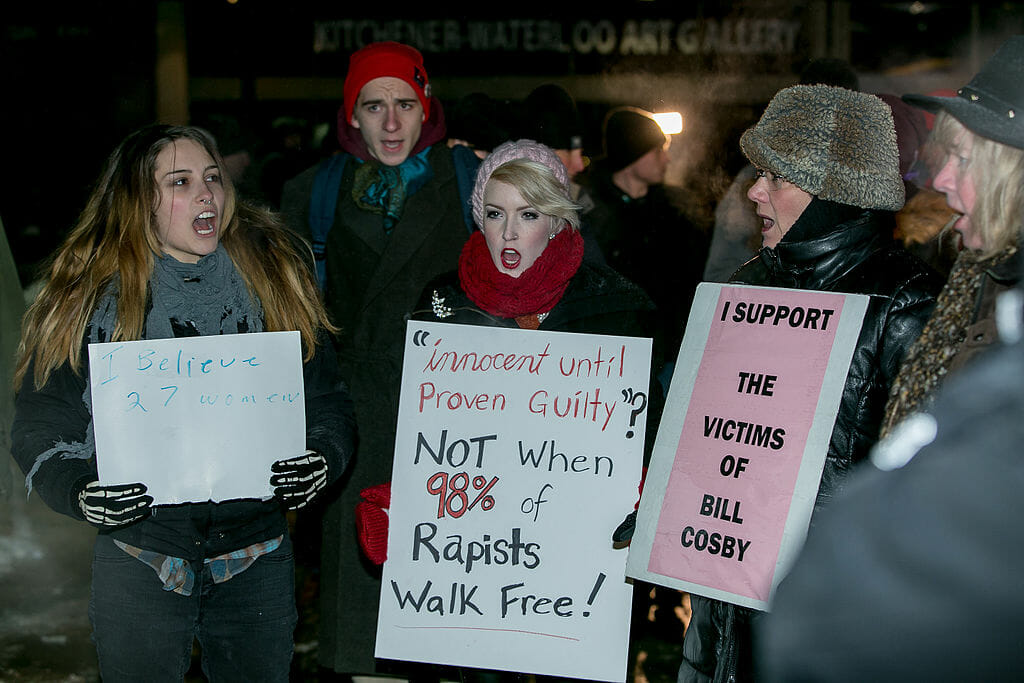 Protesters against Bill Cosby in Kitchener, Canada, before a 2015 performance by the comedian. (pixelhouse / Wikimedia)
Protesters against Bill Cosby in Kitchener, Canada, before a 2015 performance by the comedian. (pixelhouse / Wikimedia)
Moments after Bill Cosby was convicted of three counts of committing aggravated indecent assault against Andrea Constand at his Pennsylvania mansion in 2004, Gloria Allred, the lawyer who represented her and many of Bill Cosby accusers, stood before the press and said, “We are so happy that finally we can say, women are believed—and not only in a hashtag #MeToo, but also in a court of law.”
Five women besides Constand testified for the prosecution, relating how Cosby also had drugged and raped them, but this retrial took place after a mistrial and after a total of 60 women came forward with accusations of rape or other sexual attacks by Cosby. Is this a victory for women as Allred contends?
I don’t think this outcome is any sort of victory. If anything, this verdict is an anomaly, serving as a token judgment for women. It does not change all the years of previous injustices in the legal system or the norm of how rape is handled in contemporary jurisprudence, much less the pervasive reality of rape today. Will women now be believed when it comes to rape? The reality is, most things uttered by women—stereotyped as the “weaker sex”—are not believed. And rape is just one of many expressions of structural oppression to which women are subjugated.
Don’t be surprised if media reports question whether the judgment was racist, suggesting that the #MeToo movement sealed Cosby’s fate (oh look, I spoke too soon), or that Constand was a “con artist” who used a false claim of rape to capitalize even more on the $3.38 million settlement she made with Cosby in 2005 after prosecutors refused to charge him with sexual assault.
In these examples alone, we see the media’s archetypes of women that frame our lives and act as subtitles to the words that rape victims speak: the greedy manipulator, the vengeful subject who extorts money from her alleged rapist and then seeks to make him suffer again, the woman who cannot tell the truth about sex because she is angry, jilted, and/or just plain old crazy. These are not new archetypes. They are the typical, recycled objects of old that still function as the go-to response for woman haters the world over.
We know the statistics for how the criminal justice system reacts to rape accusations: Out of 1,000 rapes, 310 cases are reported to the police, 57 of these result in arrests, 11 are referred to prosecutors, seven lead to a felony conviction, and only six rapists will be incarcerated. Out of 1,000 rapes, 994 perpetrators will walk free. Comparing these figures to robbery, the conviction rate in 1,000 robberies is 22 and the incarceration rate is 20. For assault and battery, the conviction rate is double that of robbery.
When men are victims of crime, they are not asked about what they were wearing, if they might have led on the assailant, or if they might have sent “mixed signals” about their desire to be beaten up or not.
Yet in the 21st century, females still are beholden to a system that treats them as out of touch with their intellectual faculties and unable to speak clearly and truthfully.
This is what feminists refer to when they say “rape culture.” Men do not fear that we will lie about being raped. They fear we will tell the truth. So the myth of the lying, extorting, brokenhearted, manipulative female gets airtime, over and over again. The misogyny at the heart of the Cosby legal case relies upon one central and paradoxical ingredient regarding Constand’s credibility: Women are not believed.
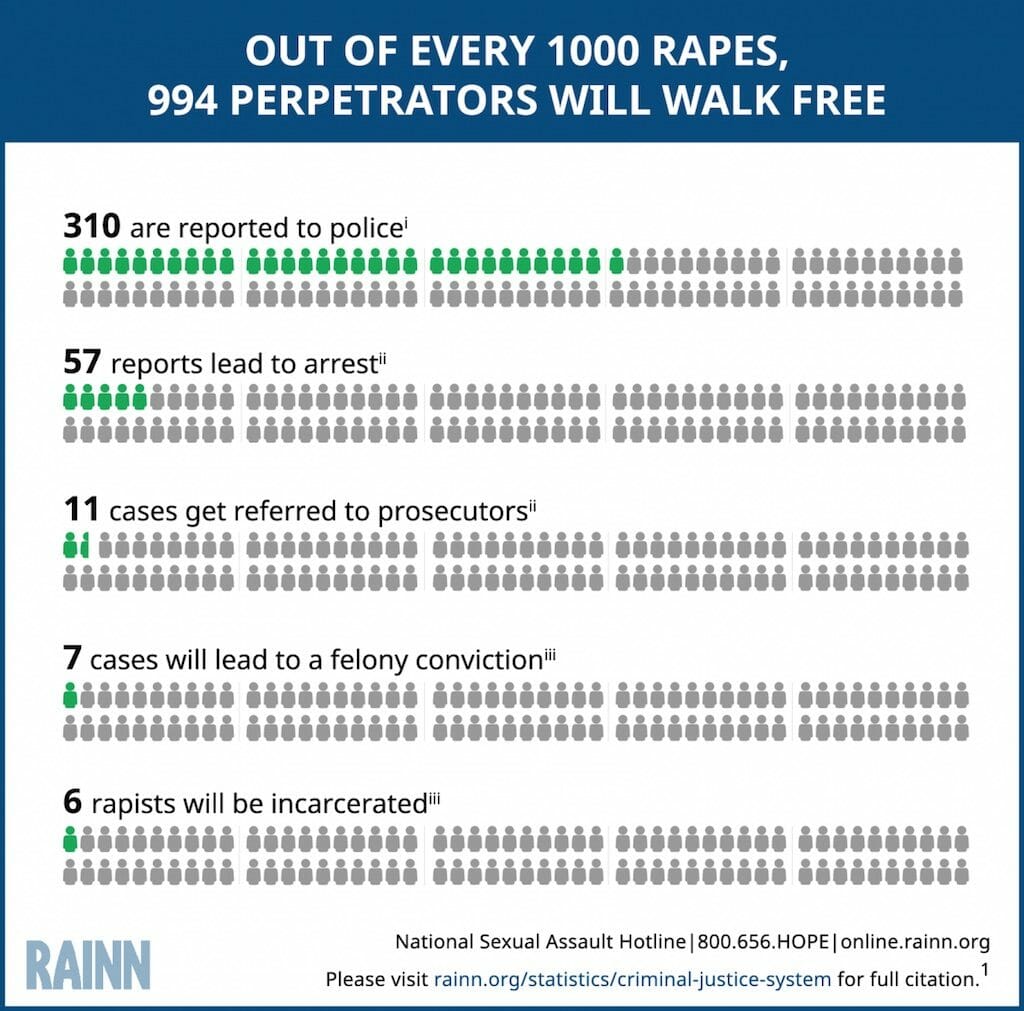
Don’t believe me? Try this experiment: Enter into Google News’ search engine two words, “man attacked,” and in a separate window do the same with “woman raped.” Now open up a half-dozen articles from each of your search results and read them. You will find that in most media stories involving women who are sexually assaulted a permutation of the word “alleged” appears throughout the story: she was allegedly raped, the alleged incident, and her alleged attacker.
Strangely enough, when men are victims of crime, all doubts about the men’s veracity vanish.
And this experiment extends far beyond Google into all levels of our society and political structures. They replicate the confirmation of men’s experience of any sort of violence and women’s fragile relationship with reality when they report sexual violence. Viewed from another planet, one would almost think that women speaking out about sexual assault is the act of terror here and not the violence of a serial rapist.
But hey, Cosby is appealing the verdict, so why not make the most of his time at The Meadows, a rehab center in Arizona? Cosby will be in good company with Harvey Weinstein, who sets the bar a bit higher than Cosby with more than 80 women accusing him of sexual harassment or sexual assault. And this will do wonders for Kevin Spacey, who is small change compared to these two sexual predators as he is being investigated for “unwanted sexual advances” and sexual assault by over 30 men. But since Spacey’s accusers are male, their accusations are taken far more seriously since men are to be believed, right? And who needs to compare sexual harassment and rape against “unwanted sexual advances”? That would be like analyzing details such as the fact that “unwanted sexual advances” has pretty much nothing to do with rape or sexual harassment. But who’s counting?
In awaiting his appeal, Cosby and his fellow predators can pass their time at The Meadows engaging in any number of activities from horseback riding, yoga, tai chi, acupuncture and meditation while they allegedly deal with their “problem.” Or as Tracey Ullman’s “Some Sort of Therapy Centre” skit communicates: “Our team of presumably therapists is here to help you tell the world, ‘It’s OK, I’m dealing with this myself, no need for the police.’ It’s the perfect place to relax, unwind and avoid facing the consequences of your actions.”
Speaking out about sexual assault and moving through trauma instead of harboring it as a unique space of anger has power. Cosby’s victims show the potential power of speech. But the realist in me knows that this verdict is a one-off performance of the law, especially in an era where reality is never real enough for some who still insist upon Cosby’s innocence. To that point, Rose McGowan’s tweet for Cosby fans was most fitting: “I’m sorry if you loved a lie.”
The Cosby verdict proves the imbalance of truth and how normal it is for females to be disbelieved: It took 60 women to be sexually attacked for one to be believed.
For all of the media scrutiny about the #MeToo movement sealing Cosby’s fate, one anomaly of justice surprised millions of people more than 50 years of serial rape. Cosby was found guilty not because one woman came forward. He was found guilty because 60 did. All but one were denied due process. Constand received justice. The rest did not.
What does the future of women’s rights look like from here? A world where only 59 victims are needed for a guilty verdict? Why not aim for two dozen? That sounds better, right?
Let’s not go crazy and hope that one woman’s voice might matter where jurisprudence recognizes her human right to not be raped in the first place.
Allegedly.
Your support matters…Independent journalism is under threat and overshadowed by heavily funded mainstream media.
You can help level the playing field. Become a member.
Your tax-deductible contribution keeps us digging beneath the headlines to give you thought-provoking, investigative reporting and analysis that unearths what's really happening- without compromise.
Give today to support our courageous, independent journalists.
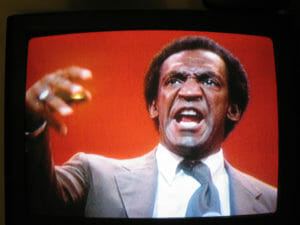


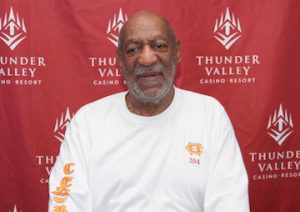
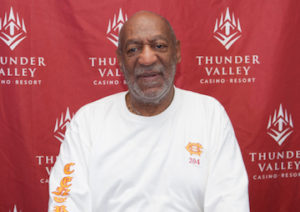
You need to be a supporter to comment.
There are currently no responses to this article.
Be the first to respond.